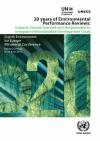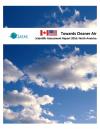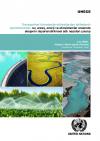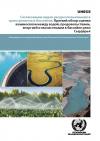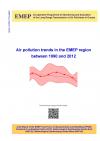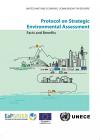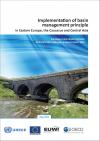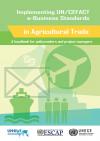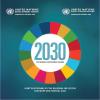Publications
Displaying Results 881 - 900 of 2829
- English
This literature review presents the first preparatory step in the development of potential guidelines for informal settlements based on the principles of the endorsed FAO ‘‘Voluntary Guidelines on the Responsible Governance of Tenure of Land, Fisheries and Forests in the Context of National Food Security’’ (VGGTs) with the support of the World Bank. Its aim is to analyze and identify the main
- English
Riding towards the green economy: cycling and green jobs, is an advance executive summary of a new study undertaken in the context of the Transport, Health
- English
This document serves as a guide for the implementation of the Geneva UN Charter on Sustainable Housing. This guidance document was approved by the Committee on Housing and Land Management at its seventy-seventh session in 2016.English
- English
For over 20 years the Environmental Performance Review (EPR) Programme has contributed to the improvement of environmental management and performance of more than 20 member states of the United Nations Economic Commission for Europe (UNECE). The voluntary EPRs have analysed countries’ progress and challenges in meeting environmental targets and commitments and promoted information exchange among
- English
- English
This publication contains the results of the assessment of the water-food-energy-ecosystems nexus ─ essentially of intersectoral links, trade-offs and benefits ─ in the Alazani/Ganykh River Basin, shared by Azerbaijan and Georgia in the Caucasus, that has been carried out in the framework of the UNECE Water Convention’s programme of work for 2013–2015. The methodology employed was developed
- English
- English
- English
- English
- English
Ten Years of the UNECE Strategy for Education for Development - Evaluation report on the implementation of the UNECE Strategy for Education for Sustainable Development from 2005 to 2015. This evaluation report summarises the progress, challenges and achievements of ECE member States from 2005 to 2015 in implementing the UNECE Strategy for ESD. The report reviews the
- English
The purpose of this report is to provide an overview of implementation of the river basin planning principle in the countries of Eastern Europe, the Caucasus and Central Asia. It is a follow-up to a benchmarking study by UNECE and OECD from early 2014, where the overall status with regard to implementation of the IWRM principles was described. With just two years passed since the previous
- English
From the beginning of the twenty first century economic, social, and political forces have been threatening the historical dominance of coal for power generation. In this context, the UNECE Group of Experts on Coal Mine Methane (CMM) presents you with a new paper titled The Challenges of the
- English
This Handbook presents a general framework for the design of of e-Business projects in the agrifood sector using open, international standards. It specifically looks at four e-Business standards developed by UN/CEFACT in the areas of:Electronic phytosanitary certificates; Electronic reporting of sustainable fishery management; Electronic exchange of laboratory analysis
- English
We are the last generation with the ability to stop climate change. If we fail, it will be a historic mistake. But there is no single “silver bullet” that can address this challenge. We need to change behaviours through the right set of rules; we need to face and adapt to the impacts that cannot be avoided; we need good data to understand where we are so we can take
- English
2030 Sustainable Development Agenda - Joint Positioning by the Regional UN System in Europe and Central Asia The 2030 Agenda for Sustainable Development underlines the important role and comparative advantage of an adequately resourced, relevant, coherent, efficient and effective UN system in supporting SDG achievement. This is applicable to the UN system at all levels – global, regional and




